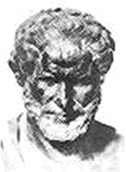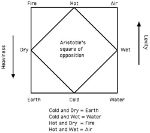Reading on: Aristotle's concepts; astronomy, matter, motion
[sources: Thomas Fowler in <www.perseus.tufts.edu/GreekScience/ Students/Tom/AristotleAstro.html> and Internet Encyclopedia of Philosophy <http://www.utm.edu/research/iep/>] [900 words]
Aristotle argued that the universe is spherical and finite. Spherical, because that is the most perfect shape; finite, because it has a center, viz. the center of the earth, and a body with a center cannot be infinite.
He believed that the earth, too, is a sphere. It is relatively small compared to the stars, and in contrast to the celestial bodies, always at rest. For one of his proofs of this latter point, he referred to an empirically testable fact: if the earth were in motion, an observer on it would see the fixed stars as moving, just as he now observes the planets as moving, that is from a stationary earth. However, since this is not the case, the earth must be at rest.
To prove that the earth is a sphere, he produced the argument that all earthly substances move towards the center, and thus would eventually have to form a sphere. He also used evidence based on observation. If the earth were not spherical, lunar eclipses would not show segments with a curved outline. Furthermore, when one travels northward or southward, one does not see the same stars at night, nor do they occupy the same positions in the sky.
Aristotle accepted Empedocles' view that there are four basic elements - earth, air, fire and water. Aristotle, however, in addition to this, postulated a fifth element called aether, which he believed to be the main constituent of the celestial bodies. This divine element, he believed, is uncompounded, ungenerated, eternal, unalterable, and neither heavy nor light. It can be found in its purest form in the celestial regions, but becomes adulterated in the area below the moon.
Aristotle's view of the universe was hierarchical, and he made a sharp distinction between the sublunar world of change, and the eternal and immutable heavens.
Substance is for Aristotle a merging of matter into form. The term "matter" is used by Aristotle in four overlapping senses. First, it is the underlying structure of changes, particularly changes of growth and of decay. Secondly, it is the potential which has implicitly the capacity to develop into reality. Thirdly, it is a kind of stuff without specific qualities and so is indeterminate and contingent. Fourthly, it is identical with form when it takes on a form in its actualized and final phase.
The development of potentiality to actuality is one of the most important aspects of Aristotle's philosophy. It was intended to solve the difficulties which earlier thinkers had raised with reference to the beginnings of existence and the relations of the one and many.
The actual vs. potential state of things is explained in terms of the causes which act on things. There are four causes:
1. Material cause, or the elements out of which an object is created;
2. Efficient cause, or the means by which it is created;
3. Formal cause, or the expression of what it is;
4. Final cause, or the end for which it is.
Take, for example, a bronze statue. Its material cause is the bronze itself. Its efficient cause is the sculptor, insofar has he forces the bronze into shape. The formal cause is the idea of the completed statue. The final cause is the idea of the statue as it prompts the sculptor to act on the bronze. The final cause tends to be the same as the formal cause, and both of these can be subsumed by the efficient cause. Of the four, it is the formal and final which is the most important, and which most truly gives the explanation of an object. The final end (purpose, or teleology) of a thing is realized in the full perfection of the object itself, not in our conception of it. Final cause is thus internal to the nature of the object itself, and not something we subjectively impose on it.
God to Aristotle is the first of all substances, the necessary first source of movement who is himself unmoved. God is a being with everlasting life, and perfect blessedness, engaged in never-ending contemplation.
Philosophy of Nature Aristotle sees the universe as a scale lying between the two extremes: form without matter is on one end, and matter without form is on the other end. The passage of matter into form must be shown in its various stages in the world of nature. To do this is the object of Aristotle's physics, or philosophy of nature. It is important to keep in mind that the passage from form to matter within nature is a movement towards ends or purposes. Everything in nature has its end and function, and nothing is without its purpose.
Everywhere we find evidences of design and rational plan. No doctrine of physics can ignore the fundamental notions of motion, space, and time. Motion is the passage of matter into form, and it is of four kinds: (1) motion which affects the substance of a thing, particularly its beginning and its ending; (2) motion which brings about changes in quality; (3) motion which brings about changes in quantity, by increasing it and decreasing it; and (4) motion which brings about locomotion, or change of place. Of these the last is the most fundamental and important.
Aristotle rejects the definition of space as the void. Empty space is an impossibility. Hence, too, he disagrees with the view of Plato and the Pythagoreans that the elements are composed of geometrical figures. Space is defined as the limit of the surrounding body towards what is surrounded. Time is defined as the measure of motion in regard to what is earlier and later. it thus depends for its existence upon motion. If there where no change in the universe, there would be no time.
Since it is the measuring or counting of motion, it also depends for its existence on a counting mind. If there were no mind to count, there could be no time.



